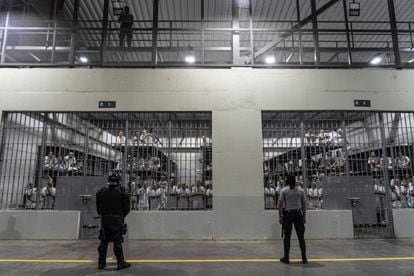It never gets dark here. Artificial light bathes the cells and the interior patio 24 hours a day. The prisoners sleep on the metal plate of iron bunks that reach to the ceiling. A closed circuit contemplates them like a silent god. They eat beans and rice with their hands because forks and knives could become deadly weapons. They wash their bodies and teeth in stone basins and relieve themselves in two toilets in the back, in sight. They go out into a huge internal hallway for a maximum of 30 minutes a day, always with shackles on their feet and hands that keep them hunched and subdued as they walk across smooth cement. Hooded police officers armed with rifles watch them from the roof. Everything smells new in the facilities, time has not yet passed them by. The inmates practice calisthenics several times a week, a series of exercises with their own body weight that keeps them strong. Most of the time they remain alone with their thoughts. They have two Bibles per room on hand, although they do not receive any type of spiritual assistance. Through the bars you can see their shaved heads and tattooed faces. If they wanted to escape, they would have to overcome four walls 60 centimeters thick and three meters high, topped by a barbed wire fence. The gravel floor would make music with his footsteps. They will never know love or freedom again. They do not have the right to calls or visits. They have slipped into a black hole, an eternal, cold and soulless non-place.
“It is impossible to escape. These psychopaths are going to spend their entire lives behind bars,” says the prison director, a burly man with glasses, who does not want to reveal his name. The Terrorism Confinement Center (Cecot), the maximum security prison in El Salvador, the Alcatraz of Central America, opened just a year ago. Nayib Bukele's eyes shine when he talks about this place. In just 20 months, the young president has struck down the two main gangs, the Mara Salvatrucha and the Barrio 18. With an emergency regime that has taken the Army to the streets and suspended constitutional freedoms, he has arrested more than 70,000 people. He has locked up young people in entire neighborhoods, which before were impossible to enter without risking their lives. The Government has publicized the prison with videos that appear to have been edited by Coppola. The feeling of dystopian reality that they transmit produces fascination. They are uncomfortable to look at, but at the same time it is not easy to look away.
Bukele has become immensely popular for this heavy-handed policy, inside and outside his borders. On Sunday he swept the presidential elections, with 85% of the votes, which will keep him in power for another five years. The opposition has ended up turned into ashes. Salvadorans, relieved after decades of violence, have given him absolute power. He has used this notoriety to perpetrate an authoritarian drift with which he controls the judiciary and the armed forces, which will soon be multiplied by five. Thus, this small nation has gone from registering the highest homicide rate in the world to one of the lowest in the region. Bukele has promised to reach Canada's ratios. The impenetrability and lavishness of this hermetic prison match the personality of a president with a tendency toward megalomania.
To access the Cecot you need to avoid four stalls placed in large concrete rooms with a desolate air. Officials with their faces covered and in a desperate mood search you all over your body. They ask you to place your hands on the back of your head. They ask if you have tattoos. The safety arches have X-rays that expose the intestines. The sound of the bolts on the iron doors sounds forceful. Little by little a feeling of confinement tightens the throat. There are eight modules with an undetermined number of prisoners that the authorities refuse to specify. The capacity is 40,000 people. No one who entered in handcuffs has ever seen the light of day again. Only a torrent of air pours in through an opening in the ceiling to which it is impossible to climb due to the smooth walls. Behind bars are the most dangerous prisoners in the country. Hitmen with dozens of murders behind them who are serving sentences of 700 years.

Tonight they watch from their cells like owls. They don't move, they don't say a word. They remain still, with their arms crossed. Silent. They convey a ghostly air with their shaved heads and well-ironed white uniforms. Their heads are shaved every five days. Almost everyone has them tattooed. The names of their gangs have been written in ink, in case there was any doubt about what their way of life was. They observe with a penetrating gaze, but nothing defiant. They are not used to seeing people from outside, dressed in street clothes. Their nondescript life unfolds among black suits of hooded police officers who drag them by the arm like cattle. Outside they were fearsome, they produced terror, now they only have a sad appearance.
Follow all the information from El PAÍS América in Facebook and xor in our weekly newsletter.
#Bukele39s #Alcatraz #impossible #escape #psychopaths #spend #entire #lives #bars